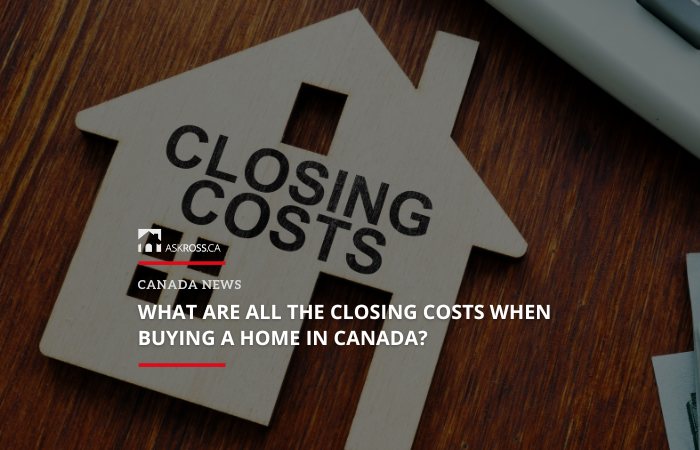
Published: September 2nd, 2025 • Last Updated: September 2nd, 2025
Author: Ross Taylor on AskRoss.ca
Complete Guide for All Closing Costs for Canadian Homebuyers in 2025
When you’re buying a home, whether it’s your first or your fifth, you’re likely laser-focused on your down payment.
But there’s another piece of the puzzle that doesn’t get nearly enough attention: closing costs.
These are the one-time expenses, above and beyond your down payment, that need to be paid before the keys land in your hand.
If you’re not prepared, they can hit hard. I’ve seen more than a few buyers scrambling at the finish line because no one warned them to budget for these properly.
So, let’s break down exactly what closing costs are, what they include, and how much you should expect to pay, so you’re not caught off guard.
If you’re a First-Time Homebuyer looking for more information, check out our page here → First-Time Home Buyers | Mortgage Services
Jump to a specific section in this article ↓↓
- What are the closing costs when buying a home in Canada?
- What are the most common closing costs in Ontario and other provinces?
- What are the prepaid expenses and adjustment costs?
- Can you add closing costs to your mortgage?
- Do first-time buyers get help with closing costs?
- Why are closing costs often underestimated?
- Advice from Ross Taylor Mortgages: Closing Costs
- All of the FAQs in this article: What Are All the Closing Costs When Buying a Home in Canada
- Additional FAQs for Canadians
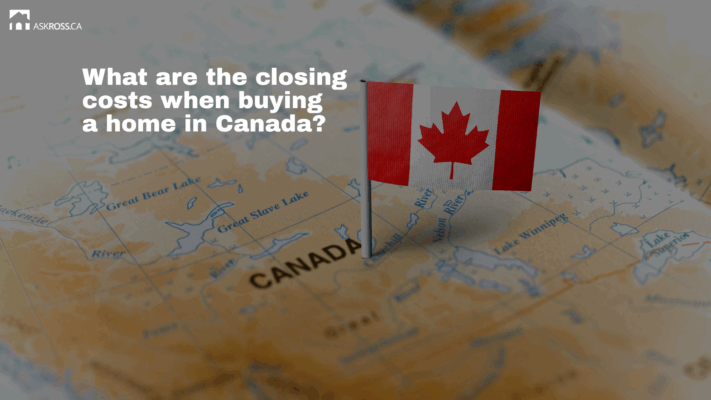
What are the closing costs when buying a home in Canada?
Closing costs are all the various fees, taxes, and expenses that come with finalizing a real estate purchase.
While the exact costs depend on your location, lender, and specific deal, one thing is constant: you have to pay these out of pocket, usually upfront and outside your mortgage.
Most Canadians can expect to pay between 3% and 4% of the home’s purchase price in closing costs.
- Example: For a $750,000 home, that’s anywhere from $22,500 to $30,000. That’s no small chunk of change.
And let me be clear, lenders will verify that you’ve got enough cash on hand to cover both your down payment and these closing costs.
You can’t just wing it and hope for the best.
If you would like to use a simple tool to calculate your closing costs → Home Closing Cost Calculator 2025 | WOWA.ca
↑↑ Back to the list at the top ↑↑
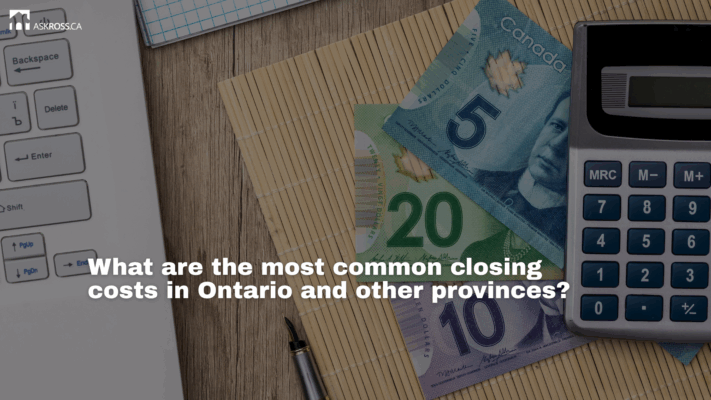
What are the most common closing costs in Ontario and other provinces?
While the types of closing costs are fairly standard across the country, some vary by province or municipality.
- For example, land transfer taxes in Ontario (especially in Toronto) are a huge line item, while other costs, like legal fees, are more consistent coast to coast.
Let’s walk through the key categories you should be budgeting for.
Land transfer tax (LTT)
This is often the biggest closing cost outside of your down payment. In Ontario, the LTT is based on your home’s purchase price, and if you’re buying in Toronto, you’ll pay a second municipal LTT on top of the provincial one.
- Pro tip: If you’re a first-time buyer, you may qualify for a rebate of up to $4,000 provincially and $4,475 municipally in Toronto.
Legal fees and disbursements
A real estate lawyer is essential to handle the legal transfer, title search, and contract review.
- Expect to pay $1,500 to $2,000 or more, depending on complexity.
This also includes disbursements, like registration fees and couriers, that are often added on top of the base fee.
Title insurance
This one-time insurance protects you (and the lender) against title fraud or defects in ownership.
- It’s usually required by lenders and costs around $250 to $500.
Home inspection
While technically optional, skipping a home inspection is like buying a car without looking under the hood.
- Budget $400 to $700, and potentially more if you need specialists (e.g., for septic systems or older homes).
Appraisal fee
Your lender wants to verify that the home is worth what you’re paying for it.
- This appraisal typically costs $350 to $500, though some lenders will cover it.
CMHC or mortgage default insurance (and PST)
If your down payment is less than 20%, you’re required to have mortgage default insurance (commonly called CMHC insurance).
- While the premium gets rolled into your mortgage, in Ontario, the 8% provincial sales tax on the premium must be paid at closing.
- Example: On a $20,000 CMHC premium, that’s $1,600 due at closing. Many buyers miss this detail.
↑↑ Back to the list at the top ↑↑
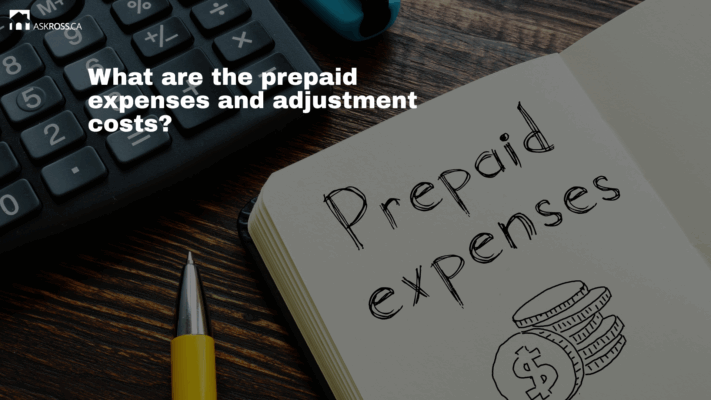
What are the prepaid expenses and adjustment costs?
These are costs like property taxes, utilities, or condo fees that the seller has already paid in advance. You reimburse them for your share as of the closing date.
These amounts can vary greatly depending on timing, but it’s not unusual to see $1,000 to $3,000 in adjustments.
Are there any other hidden or smaller fees?
There are always a few extra costs that sneak up on buyers,
- Property insurance (you must have this in place on closing)
- Status certificate for condos (about $100)
- Survey fees (if needed by the lender)
- Moving costs
- HOA or condo admin fees
- Courier or wire fees
- Certificate of insurance if you’re buying in a flood zone or rural area
Every deal is different, and these small items can add up quickly.
↑↑ Back to the list at the top ↑↑
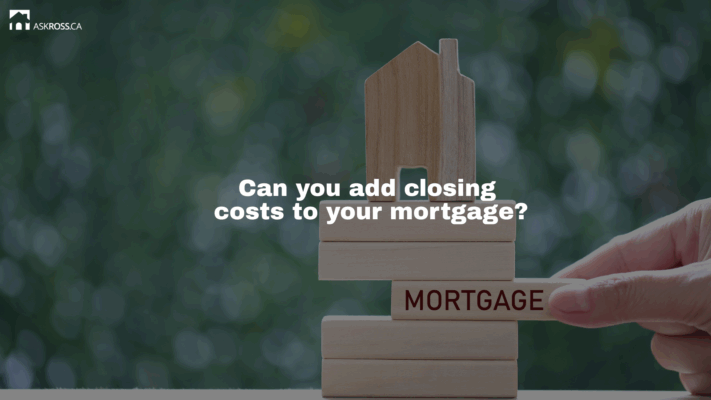
Can you add closing costs to your mortgage?
This is one of the most common questions I get, especially from first-time buyers trying to stretch their dollars. Unfortunately, the answer is usually no.
Most closing costs must be paid in cash, upfront, and cannot be rolled into your mortgage.
The only exception is CMHC insurance premiums, which can be added to your mortgage balance (but again, the PST on that premium cannot).
Lenders will want to see documented proof that you have enough saved up to cover these costs, on top of your down payment and any emergency funds you’re expected to have on hand.
↑↑ Back to the list at the top ↑↑

Do first-time buyers get help with closing costs?
There’s no broad federal program that waives closing costs for first-time buyers, but there are a few provincial perks,
- Land transfer tax rebates, as mentioned earlier
- First-Time Home Buyer’s Tax Credit (federal, claimed on your taxes)
- RRSP Home Buyers’ Plan, which lets you withdraw up to $60,000 tax-free to help with your purchase, including closing costs
Some cities or developers also offer targeted incentives, like covering part of your LTT, but these are exceptions, not the norm.
If you’re banking on a rebate to cover closing costs, make sure the funds will actually be available before your closing date.
↑↑ Back to the list at the top ↑↑
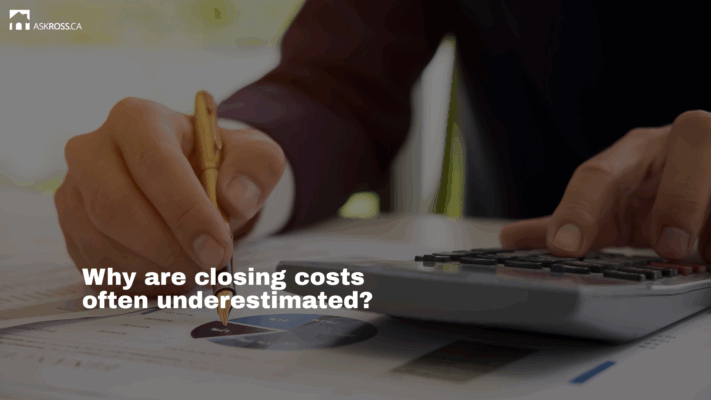
Why are closing costs often underestimated?
According to recent surveys, over 70% of first-time buyers in Canada underestimate their closing costs.
I’m not surprised. Too many buyers are focused solely on saving the down payment and completely overlook these extra costs until it’s almost too late.
And I get it. If you’ve scraped together your 5% or 10% down, an unexpected $15,000 bill is the last thing you want to hear about. But not budgeting for closing costs can delay your transaction, or worse, derail it completely.
I’ve seen buyers have to borrow from family, cash in emergency funds, or even walk away from deals they were otherwise ready to close. It’s preventable. It just takes planning.
↑↑ Back to the list at the top ↑↑

Advice from Ross Taylor Mortgages: Closing Costs
If you’re buying a home, don’t just think about what you can afford; think about what you’ll actually need in liquid cash to close the deal.
Here’s my advice for any homebuyer in Canada
- Budget 3% to 4% of the purchase price for closing costs.
- Ask your lawyer and broker for an itemized breakdown early in the process.
- Factor in provincial and municipal land transfer taxes, and they’re often the biggest line item.
- Know which expenses can’t be rolled into your mortgage, like the PST on CMHC premiums or prepaid utilities.
- Don’t forget the little things, like moving trucks or condo certificate fees; they add up.
- And most importantly, plan ahead so you’re not scrambling at the eleventh hour.
Closing costs might not be the most exciting part of buying a home, but ignoring them can be costly.
With a solid understanding and proper budgeting, you’ll be set up for a much smoother purchase and avoid costly surprises on your closing day.
↑↑ Back to the list at the top ↑↑
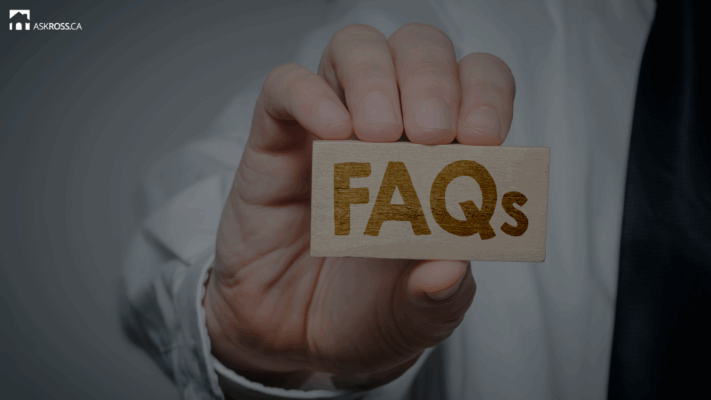
All of the FAQs in this article: What Are All the Closing Costs When Buying a Home in Canada
What are the closing costs when buying a home in Canada?
- Closing costs are one-time fees, taxes, and expenses paid upfront and outside your mortgage to finalize a real estate purchase, typically 3% to 4% of the home’s purchase price.
What are the most common closing costs in Ontario and other provinces?
- Common costs include land transfer tax, legal fees and disbursements, title insurance, home inspection, appraisal fees, CMHC insurance, PST, and these can vary by location.
What are the prepaid expenses and adjustment costs?
- These are reimbursements to the seller for prepaid items like property taxes or utilities, often ranging from $1,000 to $3,000, depending on timing.
Are there any other hidden or smaller fees?
- Smaller costs can include property insurance, condo status certificates, surveys, moving expenses, HOA fees, courier fees, and special insurance requirements.
Can you add closing costs to your mortgage?
- Generally, no, most closing costs must be paid in cash upfront, except CMHC premiums, which can be added to the mortgage balance, but not the PST on them.
Do first-time buyers get help with closing costs?
- While there’s no national program waiving closing costs, provincial rebates, federal tax credits, and programs like the RRSP Home Buyers’ Plan can help.
Why are closing costs often underestimated?
- Many buyers focus only on the down payment, with surveys showing over 70% underestimate closing costs, leading to last-minute financial scrambling or deal failures.
↑↑ Back to the list at the top ↑↑

Additional FAQs for Canadians
How much should I budget for closing costs in Canada?
- Most buyers should budget 3% to 4% of the purchase price to comfortably cover all possible closing expenses.
Are closing costs higher in Toronto compared to other cities?
- Yes, Toronto buyers pay both provincial and municipal land transfer taxes, making costs significantly higher than in many other cities.
Can closing costs be negotiated or reduced?
- Some costs, like legal fees or home inspection, can be negotiated, and first-time buyer rebates can reduce taxes, but most fees are fixed.
Do new construction homes have different closing costs?
- Yes, new builds may have additional charges like HST, development fees, and utility hook-up costs on top of standard closing expenses.
When are closing costs due in Canada?
- Closing costs are usually due on the closing day, payable to your lawyer before the property transfer is finalized.
↑↑ Back to the list at the top ↑↑

Ross Taylor Mortgages
If you want great service from someone you can trust – reach out to us today.
Get quick answers to your questions, no matter how difficult – 7 days a week.

 Apply For a Mortgage
Apply For a Mortgage